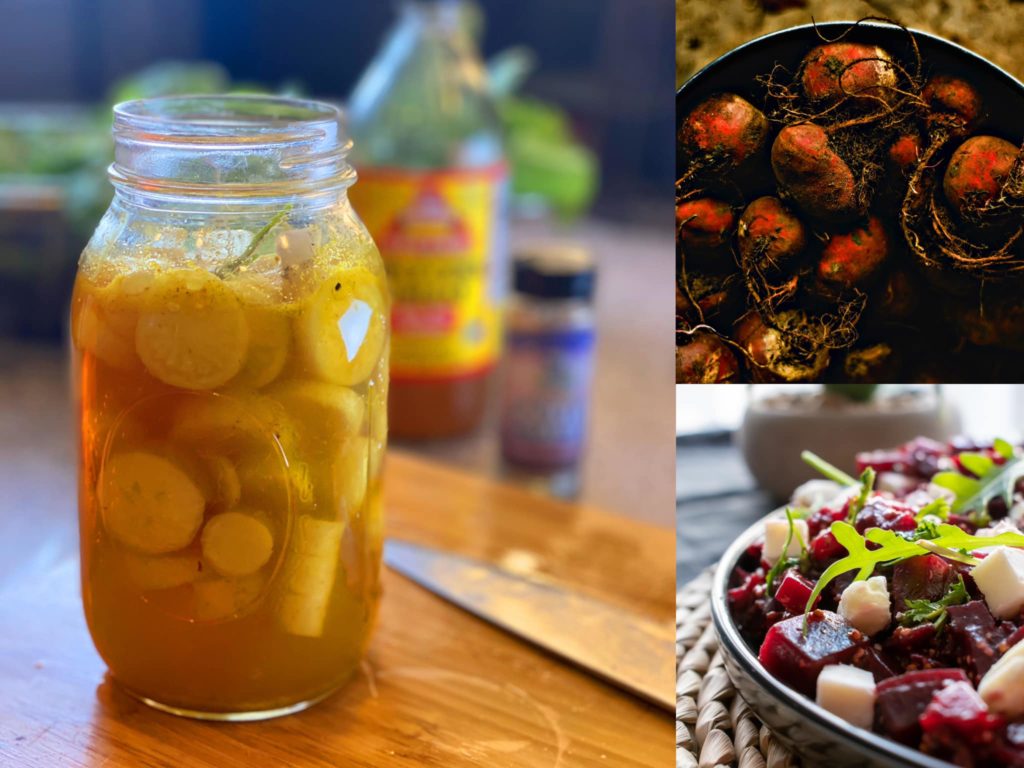Got gut health? It's not a trick question... I promise!
Last month I fermented 6 pounds of radishes and 4 pounds of beets! There is nothing more gratifying than having your pantry shelves lined with canned goods from your garden that will serve you for months to come! By the way, did you know that radishes are beneficial for all of the zodiac signs favorite foods?

Fermenting foods from your garden will feed your gut flora FAR more probiotics than any probiotic you can buy on a store shelf! Unless of course, you buy my smiling probiotic found here.You can take the girl out of Ohio but you cannot take Ohio out of the girl! 
What are fermented foods?
Fermentation is the process of biochemically modifying food by using microorganisms, probiotics, and enzymes. This allows food to be preserved for longer periods of time while also providing healthy gut flora feeding microorganisms. Not only are you getting shelf-stable food, but you are also getting a happy healthy gut!
Typically, when I speak about foods rich in probiotics, I'm referring to products that have been bacterially fermented. Mold fermentation can still create health-promoting foods, but it generally doesn’t supply the type of probiotic organisms that most benefit our guts. Some forms of yeast, especially in the Saccharomyces family, are also considered to have probiotic effects.
Why eat fermented foods?
Have you ever heard anyone say "there is more serotonin in the gut than in the brain"? This is an actual fact! This is why I named my pre and pro-biotic "smiling gut"! Because your belly will literally be happy with healthy gut flora! This in turn will help put a smile on your face too!
Types of Probiotics and Fermented Foods
There are thousands of probiotic species, and we’ve only scratched the surface in terms of characterizing them and researching their effects. But, a few main types of probiotics have been scientifically studied, and their specific health effects are well documented for the positive benefits.
Lactobacillus strains (rich in fermented veggies)
- In general, improves lactose digestion (and decreases symptoms of lactose intolerance) and boosts mucosal immune function (gut, lung, sinuses, etc.)
- Lactobacillus acidophilus can reduce serum cholesterol levels and protect against urogenital infections, decreases colon polyps, adenomas, and cancer
- Lactobacillus plantarum can reduce pain, constipation, bloating, flatulence, and inflammation in inflammatory bowel disorders
- Lactobacillus reuteri shortens episodes of diarrhea and acute gastroenteritis
- Lactobacillus rhamnosus can enhance cellular immunity
- Lactobacillus salivarius has been shown to suppress and eradicate pylori in animal models and tissue cultures
Bifidobacteria species rich in fermented veggies!
- Can help prevent and treat gastrointestinal disorders such as colonic transit disorders, colonic adenomas, colon cancer, and intestinal infections
- May prevent or improve infectious diarrhea
- Tentative evidence of protective action against the carcinogenic activity of intestinal flora
Saccharomyces boulardii This is my personal favorite probiotic! It's found commonly rich in kefir and kombucha, but also fermented veggies, dairy, and soy.
- Reduces occurrence of difficile infection
- Reduces duration of acute gastroenteritis
- In irritable bowel syndrome, may decrease functional diarrhea
High-quality fermented products are increasingly becoming available in grocery stores, but we can also reap the benefits by making your own. I promise you will be able to ferment on your own! In fact, I will provide a simple recipe here!
Although probiotic supplementation can be useful in a lot of circumstances, you can actually get a much, much broader range of probiotics (including the ones above and the less characterized but still beneficial ones) by eating fermented foods. Fermented foods have a slightly different array of microbes in each batch. So what in the heck are you supposed to eat?! Let’s start with some of these wonderful foods below!
Remember, diet is the single biggest influence on gut microbiota composition. In fact, your diet is directly responsible for more than 60% of the variation in bacterial species in the gut. Genetics, gender, age, lifestyle, hormones, drugs, supplements, and environmental exposures collectively are responsible for the remaining 40%.
Also, if you are pregnant you should be especially careful of what you consume. Why? Because a crappy diet can. lead to SERIOUS issues with your children such as autism.
The good news is that we can start improving our gut microbiomes today with dietary changes geared at fostering a vibrant and diverse gut microbial community!
In fact, dietary changes can alter the gut microbiome’s composition in a very short period of time, in a matter of a few days to a few weeks!
I only want the best for you!
I love you, Isn’t it time you love yourself?
Cilantro kisses ~ don't forget to drink your green juice
~ Andrea

















